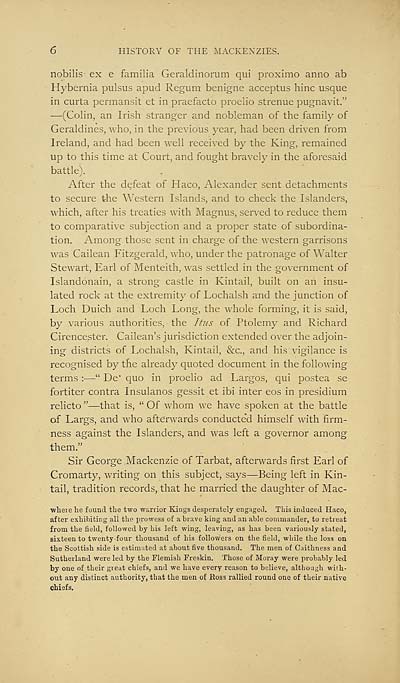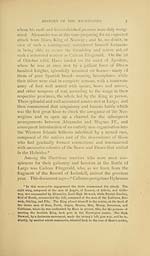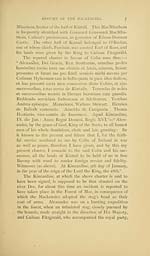History of the clan Mackenzie
(32) Page 6
Download files
Complete book:
Individual page:
Thumbnail gallery: Grid view | List view

6 HISTORY OF THE MACKENZIES.
nobilis- ex e familia Geraldinorum qui proximo anno ab
Hybernia pulsus apud Regum benigne acceptus hinc usque
in curta permansit et in praefacto proelio strenue pugnavit."
— (Colin, an Irish stranger and nobleman of the family of
Geraldines, who, in the previous year, had been driven from
Ireland, and had been well received by the King, remained
up to this time at Court, and fought bravely in the aforesaid
battle).
After the defeat of Haco, Alexander sent detachments
to secure the Western Islands, and to check the Islanders,
which, after his treaties with Magnus, served to reduce them
to comparative subjection and a proper state of subordina-
tion. Among those sent in charge of the western garrisons
was Cailean Fitzgerald, who, under the patronage of Walter
Stewart, Earl of Menteith, was settled in the government of
Islandonain, a strong castle in Kintail, built on an insu-
lated rock at the extremity of Lochalsh and the junction of
Loch Duich and Loch Long, the whole forming, it is said,
by various authorities, the Itus of Ptolemy and Richard
Cirencester. Cailean's jurisdiction extended over the adjoin-
ing districts of Lochalsh, Kintail, &c, and his vigilance is
recognised by the already quoted document in the following
terms : — " De - quo in proelio ad Largos, qui postea se
fortiter contra Insulanos gessit et ibi inter eos in presidium
relicto " — that is, " Of whom we have spoken at the battle
of Lai'gs, and who afterwards conducte'd himself with firm-
ness against the Islanders, and was left a governor among
them."
Sir George Mackenzie of Tarbat, afterwards first Earl of
Cromarty, writing on this subject, says — Being left in Kin-
tail, tradition records, that he married the daughter of Mac-
wheie lie found the two warrior Kiugs desperately eDgaged. This induced Haco,
after exhibiting alt the prowess of a brave king and an able commander, to retreat
from the field, followed by his left wing, leaving, as has been variously stated,
sixteen to twenty-four thousand of his followers on the field, while the loss on
the Scottish side is estimated at about five thousand. The men of Caithness and
Sutherland were led by the Flemish Freskin. Those of Moray were probably led
by one of their great chiefs, and we have every reason to believe, although with-
out any distinct authority, that the men of Ross rallied round one of their native
chiefs.
nobilis- ex e familia Geraldinorum qui proximo anno ab
Hybernia pulsus apud Regum benigne acceptus hinc usque
in curta permansit et in praefacto proelio strenue pugnavit."
— (Colin, an Irish stranger and nobleman of the family of
Geraldines, who, in the previous year, had been driven from
Ireland, and had been well received by the King, remained
up to this time at Court, and fought bravely in the aforesaid
battle).
After the defeat of Haco, Alexander sent detachments
to secure the Western Islands, and to check the Islanders,
which, after his treaties with Magnus, served to reduce them
to comparative subjection and a proper state of subordina-
tion. Among those sent in charge of the western garrisons
was Cailean Fitzgerald, who, under the patronage of Walter
Stewart, Earl of Menteith, was settled in the government of
Islandonain, a strong castle in Kintail, built on an insu-
lated rock at the extremity of Lochalsh and the junction of
Loch Duich and Loch Long, the whole forming, it is said,
by various authorities, the Itus of Ptolemy and Richard
Cirencester. Cailean's jurisdiction extended over the adjoin-
ing districts of Lochalsh, Kintail, &c, and his vigilance is
recognised by the already quoted document in the following
terms : — " De - quo in proelio ad Largos, qui postea se
fortiter contra Insulanos gessit et ibi inter eos in presidium
relicto " — that is, " Of whom we have spoken at the battle
of Lai'gs, and who afterwards conducte'd himself with firm-
ness against the Islanders, and was left a governor among
them."
Sir George Mackenzie of Tarbat, afterwards first Earl of
Cromarty, writing on this subject, says — Being left in Kin-
tail, tradition records, that he married the daughter of Mac-
wheie lie found the two warrior Kiugs desperately eDgaged. This induced Haco,
after exhibiting alt the prowess of a brave king and an able commander, to retreat
from the field, followed by his left wing, leaving, as has been variously stated,
sixteen to twenty-four thousand of his followers on the field, while the loss on
the Scottish side is estimated at about five thousand. The men of Caithness and
Sutherland were led by the Flemish Freskin. Those of Moray were probably led
by one of their great chiefs, and we have every reason to believe, although with-
out any distinct authority, that the men of Ross rallied round one of their native
chiefs.
Set display mode to:
![]() Universal Viewer |
Universal Viewer | ![]() Mirador |
Large image | Transcription
Mirador |
Large image | Transcription
Images and transcriptions on this page, including medium image downloads, may be used under the Creative Commons Attribution 4.0 International Licence unless otherwise stated. ![]()
| Histories of Scottish families > History of the clan Mackenzie > (32) Page 6 |
|---|
| Permanent URL | https://digital.nls.uk/95039970 |
|---|
| Description | A selection of almost 400 printed items relating to the history of Scottish families, mostly dating from the 19th and early 20th centuries. Includes memoirs, genealogies and clan histories, with a few produced by emigrant families. The earliest family history goes back to AD 916. |
|---|

